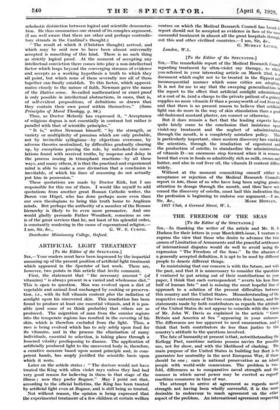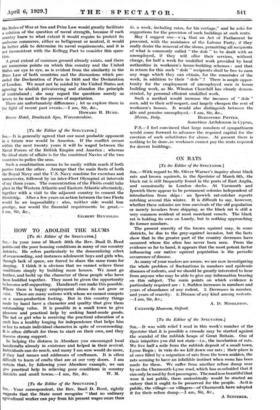THE FREEDOM OF THE SEAS [To the Editor of the
SPECTATOR.] Sia,—In thanking the writer of the article and Mr. R. S. Hudson for their letters in your March 80th issue, I venture to express the view that those who desire to advance the twin causes of Limitation of Armaments and the peaceful settlement of international disputes would do well to avoid using the expression " The Freedom of the Seas." In the absence of a generally accepted definition, it is apt to be used by different people to denote different things.
In maintaining that our concern is with the future, not with the past, and that it is unnecessary to consider the questions I ventured to put arising out of their contributions to your paper, I think that each correspondent " averts his ken from half of human fate " and is missing the most hopeful line of approach to a solution of the present difficulties between this country and the United States. Misunderstanding of the respective contentions of the two countries does harm, and the statements made by both contributors as regards the attitude of the United States do not appear to coincide with the views of Mr. John W. Davis as explained in the article " Great Britain and America at Sea " appearing in your columns. The differences are too apparent to need enumeration, and I think that both contributors do less than justice to this country's attitude to the questions involved.
The fate of humanity at present is that, notwithstanding the Kellogg Pact, maritime nations possess navies for possible use, not for show, and with the likelihood of clashing. The main purpose of the United States in building her fleet is to guarantee her neutrality in the next European War, if there should be one ; ours is national preservation as an island people with world-wide connexions. The problem is two- fold, differences as to comparative naval strength and the manner in which naval power may be exerted as regard' maritime commerce in time of war.
The attempt to arrive at agreement as regards naval strength not having been wholly successful, it is the more desirable to endeavour to reach agreement on the other aspect of the problem. An international agreement respecting the Rules•of War at Sea and Prize Law would greatly facillitate a solution of the question of naval strength, because if each country knew to what extent it would require to protect its airborne commerce, either as belligerent or neutral, it would he better able to determine its naval requirements, and it is not inconsistent with the Kellogg Pact to consider this ques-
tion.
A great extent of common ground already exists, and there are numerous points on which this country and the United States see eye to eye, as is evident from the similarity in the Prize Law of both countries and the discussions which pre- ceded the Declaration of Paris in 1856 and the Declaration of London. we must not be misled by the United States not agreeing to abolish privateering and abandon the principle of contraband ; she may regard the questions merely as levers to be used in the process of negotiation.
There are unfortunately differences ; let us explore them in the light of recent past' events.—I am, Sir, &e., Howen.o 13. HURD. Raven Hold, Droilwich Spa, Worcestershire.







































 Previous page
Previous page